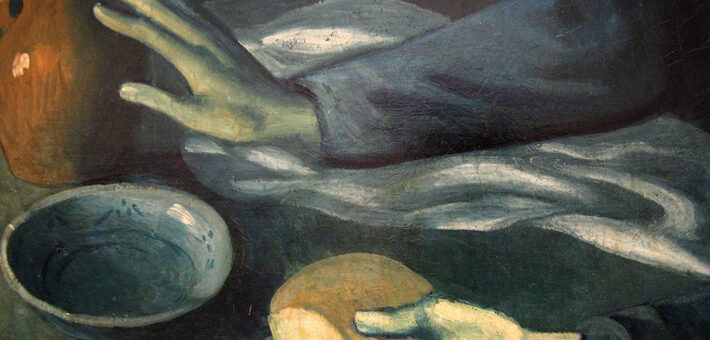Commentary on Colossians 2:6-15 [16-19]
With a wonderful mixed metaphor, our passage captures the dynamics of Christian discipleship.
“As you, therefore, have received Christ Jesus the Lord, continue to live your lives in him, rooted and built up in him and established in the faith … abounding in thanksgiving” (Colossians 2:6-7). Live or “walk” in Christ, abounding or “overflowing” in thanksgiving. Here is the dynamism of discipleship, the constant movement towards the kingdom. Yet we are also to be rooted like a tree, built up like a secure structure with an established faith of some settled certainty. If all we have is the dynamism of faith without deep roots and foundations, then we have no stability or fidelity to our lives. If all we have is roots and foundations without dynamism and change, then we are caught in the quagmires of conservatism.
While chapter 3 will bring the community more deeply into questions of how they are to live their lives in Christ, the remainder of chapter two is concerned about the possible eroding of the foundations, the losing touch with the roots of the faith, or as our author puts it, “not holding fast to the head” (Colossians 2:19).
While the precise nature of the threat to the Colossian community remains a matter of considerable exegetical debate1 there are some clear characteristics of the problem that bear remarkable resemblances to temptations faced by the church today, namely, dualism, and idolatry.
Do not be taken “captive through philosophy and empty deceit according to human tradition … ” Whatever this philosophy is, it is clear that it comes with a severe regime of bodily asceticism. Its strict imposition of calendar observances, condemnation regarding matters of food and drink (Colossians 2:16) and self-abasement or fasting (Colossians 2:17) are all preparatory to angelic visions and experiences of self-transcendence (Colossians 2:18). As the text goes beyond our reading today we see that this is a worldview and spiritual practice that promotes “self-imposed piety, humility, and the severe treatment of the body” (Colossians 2:23).
Whatever the Hellenistic or Jewish nature of this philosophy might be it is clearly an early form of dualism wherein the body, tied as it is to time and place, is seen to be a lower realm to the world of the soul, spirituality, esoteric wisdom, and the like.
And Paul’s counter to any such worldview is twofold. First, he will emphasize over and over again that such ascetic piety in fact accomplishes nothing to curb the appetites of the body that its proponents seek to control. And second, he will reflect with increasing depth and insight on the nature of embodiment in Jesus Christ.
Turning the very categories of dualism on their head our author writes that “in him the whole fullness of deity dwells bodily, and you have come to fullness in him … ” (Colossians 2:9). God embodied fully in Jesus and his followers participating in the fullness through Christ.
Are you still concerned with the real and dangerous temptations of bodily life? Then know that “in him you were circumcised with a spiritual circumcision by putting off the body of the flesh in the circumcision of Christ … ” (Colossians 2:11). There here is a dying not to embodiment itself, but to broken and sinful embodiment, and we are “buried with him in baptism” in order to be “raised with him through faith … ” (Colossians 2:12).
A resurrection faith is an embodied faith and an embodied faith has no room for dualism. The preacher need look no further than the hymn book to see that such dualism still has a hold on the imagination of the church. Our author here is defending the cosmic reconciliation that he had poetically evoked in Colossians 1:15-20 against any body/soul dualism.
But there is no embodied faith without forgiveness. And so, echoing our psalm, Old Testament and Gospel readings today, Colossians takes us to the place of forgiveness. Something remarkable happens at the cross. Our author doesn’t tell us exactly how this works, but at the cross is nailed all that stood against us, all that held us guilty, all that would strip us of the fullness of embodied life (Colossians 2:14). Trespasses, transgressions, sins are forgiven and no one gets to rule us out of the kingdom again!
Looking a little more closely, however, there is another threat to the church, a threat that has been endemic to the human condition ever since we failed to live our lives in the image of God and embraced graven images instead. While idolatry doesn’t get named until 3:5, the very rhetoric of the argument in chapter two indicates that idolatry is in the author’s sights. Remembering to always read the New Testament with Old Testament eyes, what are we to think of an argument that dismisses an opposing worldview as “empty deceit” (Colossians 2:8), mere “shadow” without substance (Colossians 2:17), a “human tradition” (Colossians 2:8), and a “human way of thinking” (Colossians 2:18)? Compare this rhetoric to classic diatribes against idolatry (Psalms 115:4-7; 135:15-18; Jeremiah 10:1-10; Isaiah 44:9-20 and others) and you will see that Colossians 2:8-23 stands in this rhetorical tradition.2
And so preaching on this text asks us to consider the idolatries that continue to have a deathly grip on our lives. Might we need to name something like the financial markets of the global economy as a “shadow” without substance? In light of our identity “in Christ,” might it be time to relativize all patriotic nationalism as a “human way of thinking”? Do we have the courage to name the Pax Americana and notions of American exceptionalism as an empty and deceitful philosophy that has taken us “captive?”
Finally, in light of our text as a tract against idolatry (and empire), the preacher needs to ask today, which rulers and authorities are disarmed at the cross and paraded behind the Messiah in triumphal procession (Colossians 2:15)? Dare we imagine these to be our rulers? Our political, economic, military, and even ecclesiastical authority structures? Are we in the captive procession?
Notes:
1 The contrasting views of Wright and Lincoln will give the preacher enough to work with. N.T. Wright, The Epistles of Paul to the Colossians and to Philemon, Tyndale Commentaries (Grand Rapids, Mich.: Eerdmans, 1986), and Andrew T. Lincoln, “The Letter to the Colossians,” New Interpreter’s Bible (Nashville, TN: Abingdon, 2000) vol. 11: 551-669.
2 For a more complete argument on this see Brian J. Walsh and Sylvia C. Keesmaat, Colossians Remixed: Subverting the Empire (Downers Grove, Ill.: InterVarsity Press, 2004): 141-144.


July 24, 2016